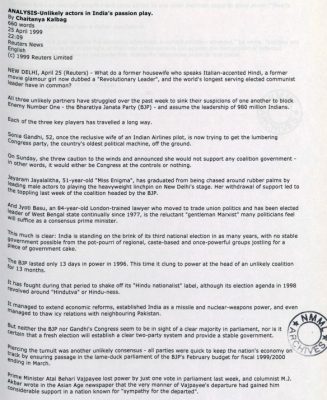ANALYSIS-Unlikely actors in India’s passion play
[Reuters]
Published date: 25th Apr 1999
25 April 1999
Reuters News
English
(c) 1999 Reuters Limited
NEW DELHI, April 25 (Reuters) – What do a former housewife who speaks Italian-accented Hindi, a former movie glamour girl now dubbed a “Revolutionary Leader”, and the world’s longest serving elected communist leader have in common?
All three unlikely partners have struggled over the past week to sink their suspicions of one another to block Enemy Number One – the Bharatiya Janata Party (BJP) – and assume the leadership of 980 million Indians.
Each of the three key players has travelled a long way.
Sonia Gandhi, 52, once the reclusive wife of an Indian Airlines pilot, is now trying to get the lumbering Congress party, the country’s oldest political machine, off the ground.
On Sunday, she threw caution to the winds and announced she would not support any coalition government – in other words, it would either be Congress at the controls or nothing.
Jayaram Jayalalitha, 51-year-old “Miss Enigma”, has graduated from being chased around rubber palms by leading male actors to playing the heavyweight linchpin on New Delhi’s stage. Her withdrawal of support led to the toppling last week of the coalition headed by the BJP.
And Jyoti Basu, an 84-year-old London-trained lawyer who moved to trade union politics and has been elected leader of West Bengal state continually since 1977, is the reluctant “gentleman Marxist” many politicians feel will suffice as a consensus prime minister.
This much is clear: India is standing on the brink of its third national election in as many years, with no stable government possible from the pot-pourri of regional, caste-based and once-powerful groups jostling for a Piece of government cake.
The BJP lasted only 13 days in power in 1996. This time it clung to power at the head of an unlikely coalition for 13 months.
It has fought during that period to shake off its “Hindu nationalist” label, although its election agenda in 1998 revolved around “Hindutva” or Hindu-ness.
It managed to extend economic reforms, established India as a missile and nuclear-weapons power, and even managed to thaw icy relations with neighbouring Pakistan.
But neither the BJP nor Gandhi’s Congress seem to be in sight of a clear majority in parliament, nor is it certain that a fresh election will establish a clear two-party system and provide a stable government.
Piercing the tumult was another unlikely consensus – all parties were quick to keep the nation’s economy on track by ensuring passage in the lame-duck parliament of the BJP’s February budget for fiscal 1999/2000 ending in March.
Prime Minister Atal Behari Vajpayee lost power by just one vote in parliament last week, and columnist M.J. Akbar wrote in the Asian Age newspaper that the very manner of Vajpayee’s departure had gained him considerable support in a nation known for “sympathy for the departed”.
Congress ideologue Jairam Ramesh said late last year that Sonia Gandhi had one singular achievement at the telm of a power-hungry party, “She has succeeded in keeping Congress out of power,” Ramesh said, while waiting for the BJP to collapse.
But Gandhi has lost some ground by trying to grab power despite a week of futile attempts to cobble together a working majority in parliament.
Sonia Gandhi has exposed herself having given up her main weapon – her reluctance and renunciation which has gone down so well with people – and come across as any other politician eager to grasp power,” Neerja Chowdhury wrote in the Indian Express.
But the Asian Age’s Akbar saw a darker significance.
“When smash and grab become the operative adjectives, a curious situation emerges,” he wrote. “Leaders and parties begin to shine not in the light of their own achievements but against the background of reflected darkness … It is the negative of one party that makes the alternative begin to look better.”






